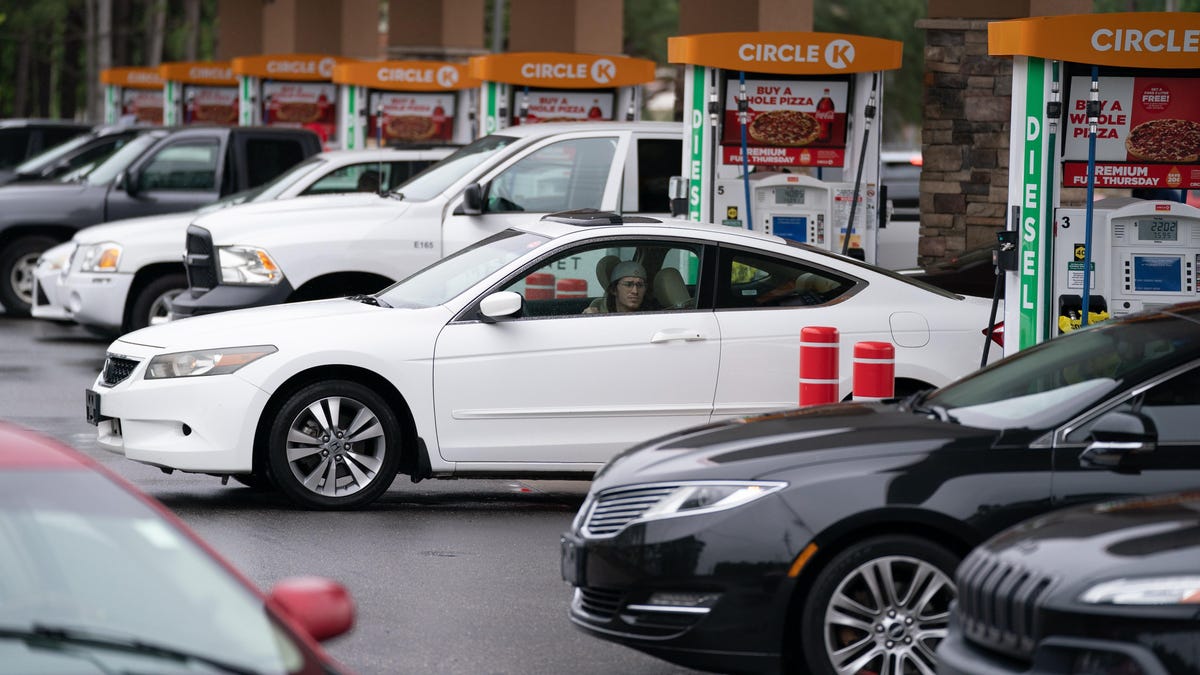North Carolina Republicans Want To Ban Free EV Chargers Unless Offered With Free Gas and Diesel

Motorists refuel at a Circle K gas station in Fayetteville, NC Photo: Sean Rayford/Getty Images (Getty Images)
Four Republican state senators introduced a strange bill in North Carolina this week that would cut haughty EV owners off from getting a little free juice at the grocery store or library unless those places also offered free gas and diesel.
Yes, members of the party that decries the participation award generation are demanding free stuff from both private and public spaces based on their personal car buying choices. Not only would the bill require locations that offer free charging to offer free gas, but would require the removal of EV chargers are locations that did not adhere to these demands.
WNCT reached out to all four republican sponsors of the Equitable Free Vehicle Fuel Stations to ask exactly who or what problem this bill was supposed to address and received a telling response:
There should be no such thing as a free charge for an electronic vehicle unless there is also free gasoline and diesel fuel for all other motorists. That’s the underlying principle of a bill filed in the North Carolina House that would create strict rules for free charging stations for electric vehicles on both private and public property.
[…]
In fact, the bill states the NC DOT or local governments can’t provide free charging stations unless they also provide free gasoline and diesel fuel. The bill also would provide state funds to remove charging stations that didn’t comply.
None of them have responded to an email from WGHP to ask why they think these steps are important, what they are trying to accomplish and what problem they are attempting to address. Neither have several other members of the House from the Triad offered insights about the bill.
This bill is likely nothing more than a time-waster to score political points, but for a moment, imagine free gas and diesel being distributed at spots where you normally find EV chargers. Let’s take the capital city of Raleigh, for example. Raleigh has 463 EV charges, 79 of which are free. The free chargers show up in spots like North Carolina State University, auto dealerships, hotels, libraries, big box stores and parking garages—places where cars sit and passively recharge while the owner goes about doing other things.
Dispensing gas is an active, volatile business, requiring well-maintained pumps and a dedicated, trained operator for those pumps. You’re also dealing with a ton of thru traffic from folks eager to load up on free gas. Fist fights broke out in North Carolina between drivers waiting for pumps during the Colonial Pipeline hack last year, so can you imagine what they’ll do for free gas? Even slightly cheaper gas creates backups and traffic nightmares already, as well as increased air pollution and environmental impacts for the surrounding communities.
Not to mention the fact that electricity is so much cheaper than gas and already readily available for access in most urban areas. It costs gas-powered cars five to six times what it costs EVs to fill up, according to Green Car Reports:
In Arizona, for example, gas averaged $5.69 per gallon during the period surveyed, while electricity averaged $0.23 per kwh. At those prices, filling up a Honda Civic would cost $70.55 while charging a Tesla Model 3 Standard Range would cost just $12.54, equivalent to $0.17 per mile for the Honda and $0.05 per mile for the Tesla, according to the analysis.
In Georgia and Florida, the cost-per-mile gap shrinks slightly, but still remains a significant $0.13 per mile for the Civic and $0.03 for the Model 3.
Who would pay for all this free gas and diesel during historic price hikes? The bill doesn’t address this issue though it provides $50,000 for the removal of publicly funded EV chargers. This is likely because the bill doesn’t help anyone, just punishes the mostly urban-based EV owners. Here’s a few of the highlights from HB 1049:
Any customer who uses an EV station must receive a receipt that lists a charge for that electrical usage.No public funds can be spent on free EV charging stations on state property – even leased property – unless free gasoline and diesel are offered, too.No city or county can spend public money to provide EV charging stations without the required free gasoline and diesel.The state would allocate $50,000 to remove EV charging stations already in place that do not comply with those stipulations.
Republican House majority whip for North Carolina was fairly unimpressed with the bill, telling WNCT after barely glancing at it that “It doesn’t seem to be something that is moving forward.” North Carolina’s own Republican governor has called for a 50 percent reduction in vehicle emissions in the state, with a goal of increasing registered EVs in North Carolina to 1.25 million. Currently, North Carolina only has a little over 16,000 EVs on their books, according to the U.S. Department of Energy. North Carolina is going to need all of the carrots and sticks in its arsenal to reach that goal.



